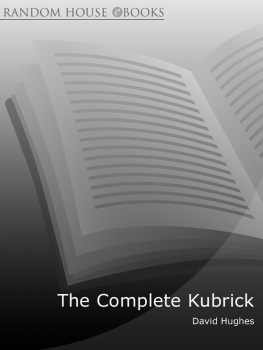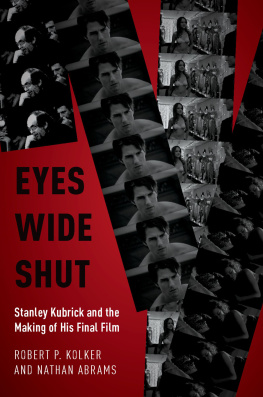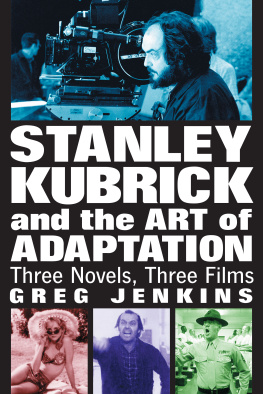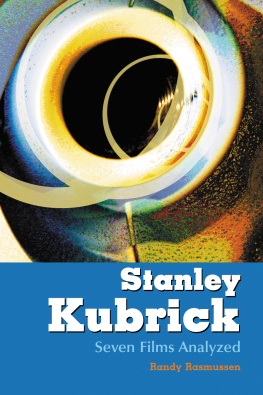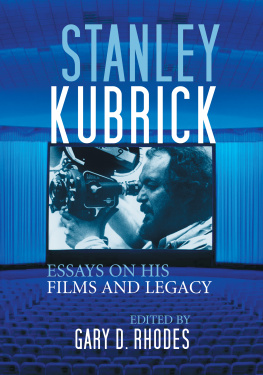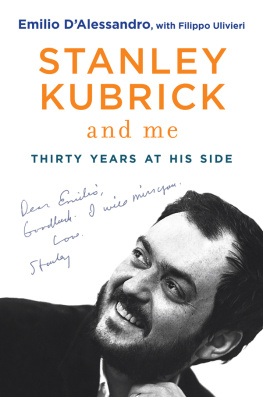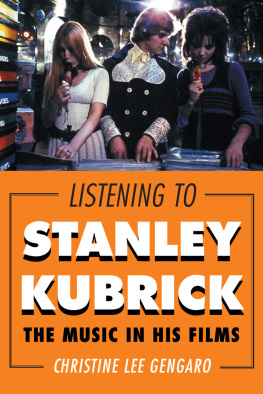David Mikics - Stanley Kubrick: American Filmmaker
Here you can read online David Mikics - Stanley Kubrick: American Filmmaker full text of the book (entire story) in english for free. Download pdf and epub, get meaning, cover and reviews about this ebook. year: 2020, publisher: Yale University Press, genre: Non-fiction. Description of the work, (preface) as well as reviews are available. Best literature library LitArk.com created for fans of good reading and offers a wide selection of genres:
Romance novel
Science fiction
Adventure
Detective
Science
History
Home and family
Prose
Art
Politics
Computer
Non-fiction
Religion
Business
Children
Humor
Choose a favorite category and find really read worthwhile books. Enjoy immersion in the world of imagination, feel the emotions of the characters or learn something new for yourself, make an fascinating discovery.

- Book:Stanley Kubrick: American Filmmaker
- Author:
- Publisher:Yale University Press
- Genre:
- Year:2020
- Rating:5 / 5
- Favourites:Add to favourites
- Your mark:
- 100
- 1
- 2
- 3
- 4
- 5
Stanley Kubrick: American Filmmaker: summary, description and annotation
We offer to read an annotation, description, summary or preface (depends on what the author of the book "Stanley Kubrick: American Filmmaker" wrote himself). If you haven't found the necessary information about the book — write in the comments, we will try to find it.
Stanley Kubrick: American Filmmaker — read online for free the complete book (whole text) full work
Below is the text of the book, divided by pages. System saving the place of the last page read, allows you to conveniently read the book "Stanley Kubrick: American Filmmaker" online for free, without having to search again every time where you left off. Put a bookmark, and you can go to the page where you finished reading at any time.
Font size:
Interval:
Bookmark:
STANLEY KUBRICK

Stanley Kubrick
American Filmmaker

DAVID MIKICS

New Haven and London
Jewish Lives is a registered trademark of the Leon D. Black Foundation.
Copyright 2020 by David Mikics.
All rights reserved.
This book may not be reproduced, in whole or in part, including illustrations, in any form (beyond that copying permitted by Sections 107 and 108 of the U.S. Copyright Law and except by reviewers for the public press), without written permission from the publishers.
Yale University Press books may be purchased in quantity for educational, business, or promotional use. For information, please e-mail sales.press@yale.edu (U.S. office) or sales@yaleup.co.uk (U.K. office).
Set in Janson Oldstyle type by Integrated Publishing Solutions.
Printed in the United States of America.
Library of Congress Control Number: 2019955073
ISBN 978-0-300-22440-5 (hardcover : alk. paper)
A catalogue record for this book is available from the British Library.
This paper meets the requirements of ANSI/NISO Z39.48-1992 (Permanence of Paper).
Frontispiece: Stanley Kubrick directing A Clockwork Orange (Courtesy of Photofest/Warner Bros)
Harold Blooms The American Canon:Literary Genius from Emerson to Pynchon (editor)
Bellows People: How Saul Bellow Made Life into Art
Slow Reading in a Hurried Age
The Annotated Emerson (editor)
The Art of the Sonnet (with Stephanie Burt)
Who Was Jacques Derrida? An Intellectual Biography
A New Handbook of Literary Terms
The Romance of Individualism in Emerson and Nietzsche
The Limits of Moralizing: Pathos and Subjectivity in Spenser and Milton
For Larry and Edith Malkin
1. I Know I Can Make a Film Better Than That:
Killers Kiss, The Killing
2. Keep Doing It Until It Is Right:
Paths of Glory, Spartacus, Lolita
3. Total Final Annihilating Artistic Control:
Dr. Strangelove
4. The Tower of Babel Was the Start of the Space Age:
2001: A Space Odyssey
5. Lets Open with a Sicilian Defence:
A Clockwork Orange
6. You Can Talk for Hours about a Thing with Stanley:
Barry Lyndon
7. Something Inherently Wrong with the Human Personality:
The Shining
8. Make Sure Its BigLon Chaney Big:
Full Metal Jacket
9. Frightened of Making the Movie:
Eyes Wide Shut
STANLEY KUBRICK

STANLEY KUBRICK told me a story about a girl he loved, Kirk Douglas recalled. He had a big fight with her, and goddamnit! He felt macho. The hell with it! Hed had enough! That was it! He packed his bag and slammed the door. He went out. As he started walking, that bag got heavier and heavier and he couldnt carry it. He had to go back.
A piquant fairy tale: male defiance is quickly foiled by fate, which brings the man back to where he started. Kubricks anecdote is also the plot of his last and most personal movie, Eyes Wide Shut. In that film the man rebels by seeking sex, but most Kubrick movies are about rebellion of some kind. Usually the rebel starts to look small, despite the sizable energies he lets loose. Being a rebel is not how you solve problems, and problem solving is very close to Kubricks heart.
When he made a movie Kubrick was obsessively focused because he had to find a solution to every problem, but he was also drawn to macho revolt, and to anything else that makes well-laid plans screw up royally. His movies are about mastery that fails. Perfectly controlled schemes get botched through human error or freak accidents, or hijacked by masculine rage. A rebellious imp of the perverse always lurks somewhere. Kubrick relishes whatever throws a wrench in the works: the antic wiles of Alex in A Clockwork Orange and Quilty in Lolita, the chest-puffing death drive of Dr. Strangeloves nutjob generals, Jack Torrances wild anger in The Shining, the sudden fury that conquers Barry Lyndon at the sight of his stepson Bullingdon. A zestful insanity courses through the rigid champions of order, like Drill Instructor Hartman in Full Metal Jacket. Finally, after all this tearing apart, Kubrick comes back home at the end of Eyes Wide Shut, and shows us the intimate, ordinary life of a married couple.
Kubricks movies are outliers, and we look at them differently than most popular films. Whether the Kubrick hero is a rebel like Alex in A Clockwork Orange or a calm problem solver like Dave Bowman in 2001, we observe him across a distance and with ambivalence, instead of rooting for him in classic Hollywood fashion. Kubrick likes to trap his characters, put them on display. He is an arch modernist, allergic to tearjerkers, joyous endings, and scenes full of heart. His work also argues against most film noir and outlaw movies, which prize wicked self-possession and cool, from The Maltese Falcon down to Tarantino. Yet for all these avoidances Kubricks movies were and are hugely popular: 2001, intensely slow, quiet and abstract, became one of MGMs ten biggest moneymakers. Moments from Kubrick movies are as iconic as anything in The Godfather, a film Kubrick loved but which, in stark contrast to his own work, achieves a classic Hollywood trifecta of pathos, violence, and male bravado.
Kubricks detractors argue that his movies dont sufficiently champion the human soul against the constricting routines they depict. Kubrick seems to them to be on the side of oppression, his movies cold, ponderous, and heavy-handed, extreme in all the wrong ways. One could, of course, say the same of Kafkas writingand Kubrick was a devoted reader of Kafka.
The deep-frozen impersonality that some claim to see in Kubrick is really his rejection of Hollywood pathos: the hero who drinks because he cant get over a dame, the brave heroine blinking back tears. Kubrick doesnt do what the movies are supposed to do, give you satisfying cathartic jolts. Nor is he austere in the manner of the European art film, though he admired Antonioni and, especially, Bergman. Film critic James Naremore writes that Kubricks crystal-clear images give a sense of authorial understanding without immersion, as if volcanic, almost infantile feelings were being observed in a lucid, rational manner.
Kubricks aloofness coexists with a kids heart and a kids upsetting energy. His movies show an odd mating of hyperaware adult rationality and the raw feelings of a child. Childhood is telling: Kubrick the mischievous, stubborn little boy is at the core of his films, along with the grown-up director, calm and in control, who liked nothing better than staying home and making movies.
Theres a home movie of Stanley Kubrick clowning around, probably at about age eight, hamming it up for his kid sister Barbara. Wearing oversized pants, he does a slapstick dance routine. At one point his grin looks a little like Alexs: malicious delight. Little Stanley got poor grades in conduct and playing with others. He had a strong Bartleby side: he never had a bar mitzvah, from sheer lack of interest.
Next pageFont size:
Interval:
Bookmark:
Similar books «Stanley Kubrick: American Filmmaker»
Look at similar books to Stanley Kubrick: American Filmmaker. We have selected literature similar in name and meaning in the hope of providing readers with more options to find new, interesting, not yet read works.
Discussion, reviews of the book Stanley Kubrick: American Filmmaker and just readers' own opinions. Leave your comments, write what you think about the work, its meaning or the main characters. Specify what exactly you liked and what you didn't like, and why you think so.

